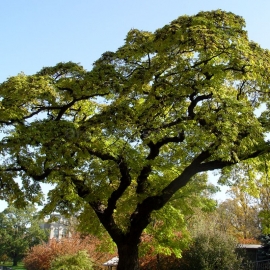







Organic Amur Cork Tree Seeds (Phellodendron Amurense)
1.14 €
Amur cork tree, called Huang Bai in China, is commonly used in Chinese herbalism, where it is considered to be one of the 50 fundamental herbs, but one that should be used with care.
-
Organic Amur Cork Tree (Phellodendron Amurense)
Amur cork tree, called Huang Bai in China, is commonly used in Chinese herbalism, where it is considered to be one of the 50 fundamental herbs, but one that should be used with care.
A strongly bitter remedy, the bark acts strongly on the kidneys and is regarded as a detoxicant for hot damp conditions. Recent research has shown that the plant is useful in the treatment of meningitis and conjunctivitis. Huang Bai should only be used under professional supervision and should not be take during pregnancy. The bark is alterative, antibacterial, antirheumatic, aphrodisiac, bitter stomachic, cholagogue, diuretic, expectorant, febrifuge, hypoglycaemic, ophthalmic, skin, vasodilator and tonic.
It is taken internally in the treatment of acute diarrhoea, dysentery, jaundice, vaginal infections including Trichomonas, acute urinary tract infections, enteritis, boils, abscesses, night sweats and skin diseases. It is commonly used in conjunction with Scutellaria baicalensis and Coptis chinensis in a preparation called 'injection of three yellow herbs'. It is given intramuscularly for upper respiratory tract infections. The bark of 10 year old trees is harvested in the winter or spring and dried for later use. The fruit is expectorant.
Dark green compound leaves 10-15" long; in habit, usually broader than tall when mature and grown in the open, with a few massive spreading branches; nice furrowed corky or ashlike bark on old trees, gray brown; good landscape tree for large open spaces; native to Manchuria, Japan.
